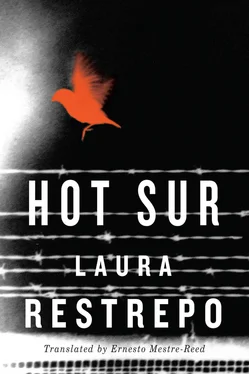From Cleve’s Notebook
“Why do we kill people who kill people to show that killing people is wrong?” Norman Mailer is said to have asked. It’s a good question. Not to even mention making a public display of the punishment of some as a show for others. That’s how we are — until very recently civilized humankind made a show of hangings in the public plazas, the last such case well into the twentieth century. In the end, how much more advanced is the lethal injection, that aseptic hypocrisy in which the condemned is put on exhibit behind glass before the carefully chosen audience that gets comfy in the little theater to witness death. How far have we really come from the ancient sacrifice nailed to the cross, today’s condemned tied down with leather straps, arms spread crosslike? The grotesque senselessness of Manninpox disgusts me, even the structure itself; I loathe its bizarre and pretentiously aristocratic architecture. And for what? Who are we? How fake can we get? How much buffoonery and cruelty are we willing to tolerate to anchor ourselves in a prestigious past that is not ours?
Interview with Ian Rose
Compared to the breadth and scope of the strange fortress of Manninpox, Rose found that the Best Value Inn and the nearby buildings looked like tiny cardboard houses, and that Mis Errores seemed small and ramshackle, a truly miserable joint, as if all the desolation of the world were condensed around the few tables, or as if all the flies of the world had agreed to shit on the red plastic lamps that produced such a measly light it wearied the soul.
“We’re empty now because it’s not visiting time. That’s on Saturday, at two in the afternoon, and the place gets packed then with family members coming to see the girls. They used to come by train, but now there’s no more train, so they come in buses or cars. Or they take taxis.” The owner of the bar, with his back to Rose, recited the string of events as if he were a tourist guide. “Many come by taxi, spend the night in the Best Value, and wait till one, when the white minivans from the prison come to pick them up and take them in. It’s sad watching them. The guards treat them as if they too are delinquent, no patience, insulting them when they don’t follow instructions. It’s just that the majority of the prisoners are Spics. Or African-Americans. Most of them are black or Latinas; you won’t find too many white girls. Some families come from far away, particularly from Mexico, the Dominican Republic, Puerto Rico. And Colombia. Every day there are more Colombians, snatched because of drugs — you know, Pablo Escobar, the cartels, that whole story. By six the families are back, because visiting hours end at five. It’s a tragedy having a loved one in prison. People feel pity for the prisoners, but they don’t think about those in the family, who almost always are old folk and children. Many of the prisoners’ children end up with the grandparents. And remember, they have to pay the fare to get here and back. The taxi drivers are my best customers, the ones who consume the most. They stay here watching a soccer game on TV or playing cards, and with the fares they have just made they can afford anything on the menu. The families, on the other hand, are often the worst, I hate to say it. They arrive broke after having paying for the journey, which sometimes includes a plane ticket. So guess who takes the hit. Me, of course. Because they set up camp inside the bar, take over tables for hours, use the bathroom, shave and groom in the bathroom sinks, fall asleep on the benches, and pay for just coffee and soda, because they don’t have much else. The worst are the poblanos , you know, the ones from Puebla in Mexico. They come by the dozens and bring food from their homes, chili peppers and other spicy things and tortillas, they’re nuts about tortillas. I had to forbid them to come in with food and even hung a sign outside warning them: ‘Prohibido entrar con comidas y alimentos.’ Just like that, in Spanish, because I put it up mostly for them, the poblanos. Roco wrote it out for me and I copied the letters on the wooden sign; you can say he did the brainwork and I did the handiwork, but it was no use when it came down to it. ‘Oye, señor,’ I try telling the poblanos. ‘Yo vender comida, tu comprarlo.’ Ever since Roco left, it’s hard to get them to listen. They pretend not to understand and order a single dish: ‘Give to us a spaghetti with meatballs.’ One dish for all of them. You can understand how I can’t run a business like that. And the worst of it is that they push the pasta to the side of the plate, take out the bag of tortillas and fried beans, and make tacos with my meatballs, they just can’t help it. That’s why I get along better with the taxi drivers, yes sir, much better. You can even have a conversation with them, so much better to deal with people who speak your own language and behave properly, folks you can trust, knowing that if they order spaghetti and meatballs, they’re going to eat the meatballs and the spaghetti.”
“What about the name of the place?” Rose asked, remembering he had seen the name mentioned in one of Cleve’s graphic novels.
“I didn’t name the place, Roco did. His parents are from Costa Rica. It was his idea.”
When he got back home, Rose hid the polyester pouch in his sock drawer and immediately went up to the attic to look through Cleve’s papers. He had never done that before, had never even thought about doing it, believing it to be a violation of privacy, but now he needed to know more. He wanted to know more about the world in which his son had become entangled where women prisoners engraved leather mandalas in the towers of their medieval castle. Cleve was an organized young man who had kept his things in order; Rose imagined it wouldn’t be difficult to find the papers relating to the time Cleve taught the workshop at Manninpox.
The task took Rose less than an hour. María Paz’s real name was there, as were her surnames, her astrological sign, her age, her nationality, and even the exercises and homework she did for the class, pages and pages with new autobiographical fragments that amplified what Rose had already read. There were even copies of her admission papers to the prison, the mug shots with the prison ID number held over her chest, which revealed a rather striking young woman, with a gloomy look, big lips, and brow so furrowed that the eyebrows touched. So this was María Paz. He could finally have a close look at her: defiant, contrary, and wild haired — possessed by some demon. This little fireball must give them hell, he thought. But at the same time Rose had to admit she was attractive, seductive, which Cleve must have certainly noticed. She was dark-skinned, with evident Latin features and untamed hair that refused to remain pinned behind her, as they must have ordered her to do so that her ears were visible in the picture. But hers wasn’t a mane of hair that would remain still or that would obey orders from those who would presume to identify individuals by their ears. This was hair that would escape in rebel tresses like creeping vines, or serpents that could strike if you got too close. Hair like Edith’s, Rose thought.
“Good Lord, Cleve, what a creature,” he said aloud, looking at the picture. “What a don’t-mess-with-me look your little friend has. This is a caged animal that has just realized that the fight is to the death.”
Rose had found out the true identity of the girl, had seen her picture, knew what she looked like, and now he needed to know more. He had to learn what her crime had been. He found nothing on the Internet under her real name, but he kept looking.
“I’m not saying that I was looking to blame her for Cleve’s death,” he tells me. “That couldn’t be, since she was in prison at the time of the bike accident. No, that couldn’t be. I was simply being guided by a scent, and everything seemed to indicate I was on to something.
Читать дальше












